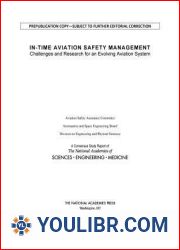
BOOKS - In-Time Aviation Safety Management: Challenges and Research for an Evolving A...


US $8.76

850356

850356
In-Time Aviation Safety Management: Challenges and Research for an Evolving Aviation System (National Academies Press of Sciences, Engineering, Medicine Consensus Study Report)
Author: National Academies of Sciences, Engineering, and Medicine
Year: April 12, 2018
Format: PDF
File size: PDF 3.0 MB
Language: English
Year: April 12, 2018
Format: PDF
File size: PDF 3.0 MB
Language: English
Decades of continuous efforts to address known hazards in the national airspace system (NAS) and to respond to issues illuminated by analysis of incidents and accidents have made commercial airlines the safest mode of transportation. The task of maintaining a high level of safety for commercial airlines is complicated by the dynamic nature of the NAS. The number of flights by commercial transports is increasing; air traffic control systems and procedures are being modernized to increase the capacity and efficiency of the NAS; increasingly autonomous systems are being developed for aircraft and ground systems, and small aircraft?most notably unmanned aircraft systems?are becoming much more prevalent. As the NAS evolves to accommodate these changes, aviation safety programs will also need to evolve to ensure that changes to the NAS do not inadvertently introduce new risks. Real-time system-wide safety assurance (RSSA) is one of six focus areas for the National Aeronautics and Space Administration (NASA) aeronautics program. NASA envisions that an RSSA system would provide a continuum of information, analysis, and assessment that supports awareness and action to mitigate risks to safety. Maintaining the safety of the NAS as it evolves will require a wide range of safety systems and practices, some of which are already in place and many of which need to be developed. This report identifies challenges to establishing an RSSA system and the high-priority research that should be implemented by NASA and other interested parties in government, industry, and academia to expedite development of such a system.














































